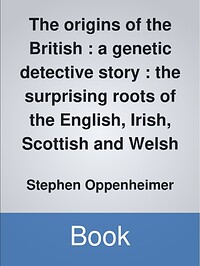Status
Call number
Genres
Collection
Publication
Description
Stephen Oppenheimer's extraordinary scientific detective story combining genetics, linguistics, archaeology and historical record shatters the myths we have come to live by. It demonstrates that the Anglo-Saxon invasions contributed just a tiny fraction (5%) to the English gene pool. Two thirds of the English people reveal an unbroken line of genetic descent from south-western Europeans arriving long before the first farmers. The bulk of the remaining third arrived between 7,000 and 3,000 years ago as part of long-term north-west European trade and immigration, especially from Scandinavia - and may have brought with them the earliest forms of English language. As for the Celts - the Irish, Scots and Welsh - history has traditionally placed their origins in Iron Age Central Europe. Oppenheimer's genetic synthesis shows them to have arrived via the Atlantic coastal route from Ice Age refuges including the Basque country; with the modern languages we call Celtic arriving later. There is indeed a deep divide between the English and the rest of the British. But as this book reveals the division is many thousands of years older than previously thought.… (more)
User reviews
I should like to see how he explains the accounts of the arrival of South Saxons under Aelle and his sons.
It's also annoying that he talks about England and Wessex &c. anachronistically. Still maybe GK Chesterton actually knew something when he wrote
"Before the Roman came to Rye or out to Severn strode,
The rolling English drunkard made the rolling English road."
And the
Oppenheimer's work lays out the genetic influences of the British population (excluding post-WWII immigration) and his findings are well worth knowing. The genetic analysis sets out the post-Ice Age colonisation phases and the most significant plus points of the book are the genetic debunking of wipeout theories and the co-existance of Germanic, Scandinavian, and Celtic peoples in Britain.
The spread of western European peoples from Ice Age refuges and the development of culture and language inevitably means that the peoples of those countries are somewhat similar. What Oppenheimer's analysis of the genetic research shows is that there are observable differences and that those differences can trace a history of Britain that has had far less intrusion from overseas than is typically suggested.
There are two issues that I have with the book - the writing is not of the highest quality and the genetics themselves are not well explained. The writing does not flow and is tough going, I did feel as though I was reading a dissertation at times and not an especially well written one. This is not really popular science and the logical chain is not easy to follow as Oppenheimer leaps into asides and tangents.
I really do though wish that the genetics had been better and more fully exposed. Traditional history is interesting but hardly new. The movement of genes deserved a fuller treatment and there is not one point in Oppenheimer's work in which he lays out explicitly the genetic map of Britain.
Overall, this is the sort of book to read if you really do want to delve into some of the science and the emerging picture that genetics paints of north western Europe. It is not a light read and it raises more questions than it answers but the broad overview that the detail conjures is a great platform for better understanding who we British are.
